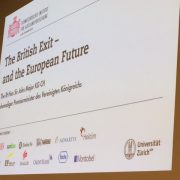John Major on The Brexit
John Major on The British Exit – and the European Future; University of Zurich, KOH-B-10, October 17, 2016, 18:40 – 19:26 h. Organised by the Schweizerisches Institut für Auslandforschung SIAF.
für Auslandforschung SIAF.
It was an honor and a privilege to have the former British prime minister visit the University of Zurich. It was great to be able to experience the Rt Hon Sir John Major KG CH at first hand. The presentation was even more relevant because of the recent vote of the UK to exit the European Union. Therefore it was no wonder that the lecture hall was filled to almost the last seat available, i.e. about 440 attendees.
Former prime minister John Major argued that the exit came as a surprise to many. According to him there were going to be many negative consequences. Subsequently he praised the overall achievements of the European Union, acknowledging some difficulties. In particular the key achievement being peace in Europe after the first and second world war. On the other hand, one of the mistakes the EU in his opinion did, was to let too many countries adopt the Euro too early. As a result, Sir John argued that the vote in favor of the Brexit had to do with the fact, that many British citizens hadn’t seen a raise in their living standard for the past 10 years.
Now to the topic of this blog: How good a public speaker is John Major?
On the positive side:
- Use of humor: He opened and ended his speech with a joke. First with a joke about Gorbachev, then with one about Jelzin. John Major also deflected some potentially difficult questions with humor during the Q&A session.
- Declaring his standpoint: He clearly said what his personal opinion was about the Brexit: He thinks it was a mistake. Comment: This puts things into perspective and let’s the audience understand more easily that he leans to one or the other side of the argument.
- Relate to the audience: Sir John related to a large part of the audience when he (sarcastically) asked the students in the audience: “Are 65 million British citizens going to get the same deal as 500 million citizens of the EU? Discuss!” He earned a big laugh from that (, assuming that that will not be the case).
Areas for improvement:
- Voice: John Major’s voice was not constantly audible. His voice tended to soften at the end of sentences to the point that he could no longer be understood. Suggestion: Articulate clearly and loudly until the end of every sentence.
- One sided: Many arguments were unbalanced. E.g. NATO is good, Russia is bad. (No mention of the promise that NATO gave to Russia: We will not expand NATO if you let us reunite Germany.) Suggestion: When preaching to the converted that works fine, probably less so when speaking to a large number of (most likely) critical university students.
Conclusion:
Most noteworthy is Sir John Major’s humor. Unfortunately he could not always be acoustically well understood. In addition, in a school paper (and, in my humble opinion, hopefully by the press) he would have been asked to give a more balanced view.
This was a worthwhile event to go to, if only to experience first hand how a former and current leader speaks.
On a scale of 1 (stay home) to 10 (world champion): 7


